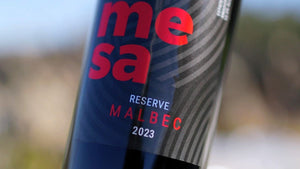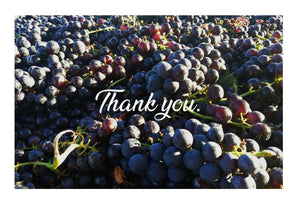The Winemaking Difference
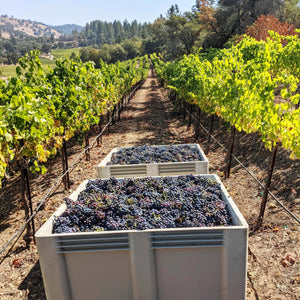
Great Wines Start with Great Fruit.
Grown right here. There is no better way to make great wines than to walk the rows, control growing conditions and taste the ripening grapes to best determine when they are absolutely perfect for harvest.
By growing our own grapes, we control everything from vine-to-bottle to give you the best quality wines and tasting experience.
Our high-altitude vineyards are on steep terraced hillsides at 2,000 foot elevation where we grow Rhône and Italian varietals (9 total) that thrive in the rich red volcanic granitic soil. The special rootstock we selected goes deep to tap Sierra water, with over 35 inches falling annually here, essentially allowing us to dry farm and extract exceptional flavor from our terroir. Temperatures fluctuate up to 40 degrees with the heat from the central valley and cool nightly breezes from the mountains, most closely resembling the regional climates of Northern Rhône, France and Puglia, Italy.
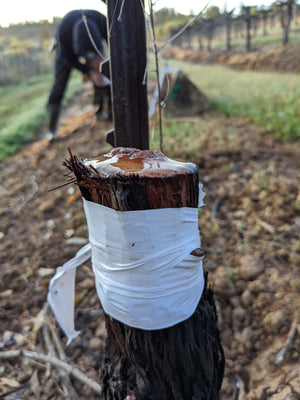
Grafting
We use grafting techniques to add new varietals on the existing old rootstock. In our 2020 season we grafted new Gamay, Roussanne, Mourvedre and Syrah.
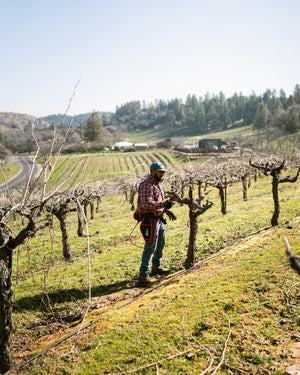
Pruning
All 8,500 of our vines are meticulously pruned, ensuring consistency and high quality. (That's 250,000 cutting decisions every season!)
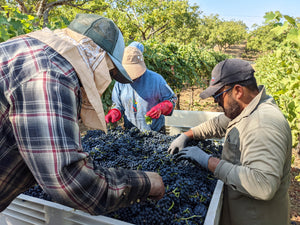
Harvest
We hand-pick our grapes and use smaller-scale winemaking equipment to bring out the best of the grapes from our Sierra terroir.
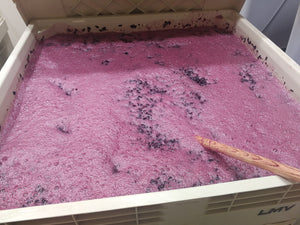
Fermentation
Careful monitoring of fermentation conditions and progress allows us to decide when to proceed to the press.
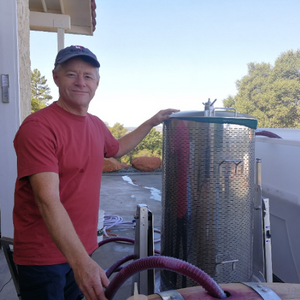
Gentle Pressing
Special bladder and pneumatic presses allow us to make highly complex and technical small-batch wines such as our Barbera Blanc, Sparkling Primitivo Rosé and Gamay (pictured).
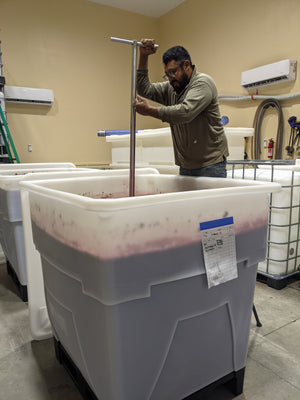
Punch-downs
It's hard work, but routine manual punch-downs and monitoring allows for full extraction of rich colors and complex flavors.
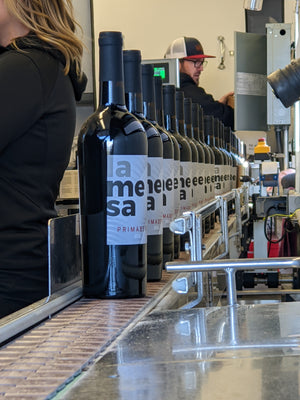
Bottling
The final step is a crucial one in making a quality finished product that is ready for consumption. Special bottling equipment allows for sterile filtering, filling, corking, capsuling, labeling and casing.
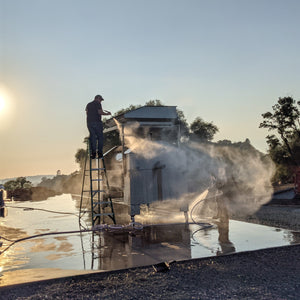
Sterility
One key detail that separates average wines from great ones is the (often thankless) work that goes into making sure every tool, tank and container that touches the wine is free from contaminants. We spend many long hours making sure all the equipment we use is immaculate.
Estate Grape Varietals
These 9 varietals are grown on the La Mesa Vineyards estate.
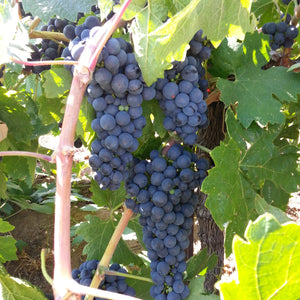
ESTATE PRIMITIVO
Primitivo
Planted in 2003, these are our oldest vines. The Primitivo is a close relative of the Zinfandel, yet lighter, less dense and ripens more evenly in our local climate. It grows head-trained on our lower hillside block, dry farmed on deep-rooted special rootstock to extract maximum flavors and minerality from this terroir. We make our award-winning red Primitivo, Rosé, Primabera and Seta blends from these grapes.
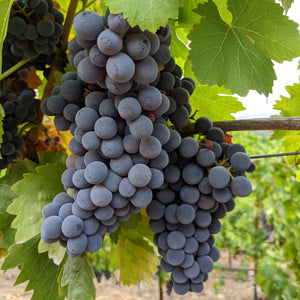
ESTATE GRENACHE
Grenache
One of the grapes on our estate is the Grenache “Alban” clone - John Alban, one of the famous “Rhône Rangers” was the pioneer of Rhône varietals in California, establishing his vineyard in Edna Valley of San Luis Obispo. We chose this clone for its small berry size and intense aroma and flavor, not to mention Alban’s award-winning wines. It is planted on the top block of our upper hillside on trellis wires in soil that is characterized as slightly acidic, clay and decomposed granite, low limestone and good exposure to heat – ideal growing conditions for this grape.
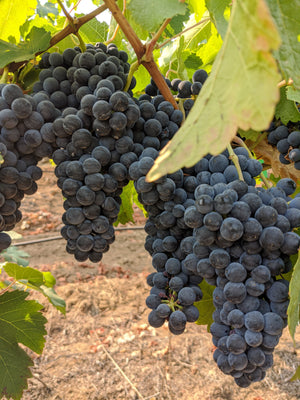
ESTATE BARBERA
Barbera
Barbera is celebrated for its deep color, low tannins, high acid and intense aroma and flavor. Our Barbera grows on the mid-block of our upper hillside vineyard on trellis. The vines benefit the most on this hillside from cool nights and warm days. The soil is comprised of mineral-rich, slightly acidic clay and decomposed granite soil with a reddish tint from its iron content. We make our red and Barbera Blanc from this grape along with our La Notte port and Primabera blend.
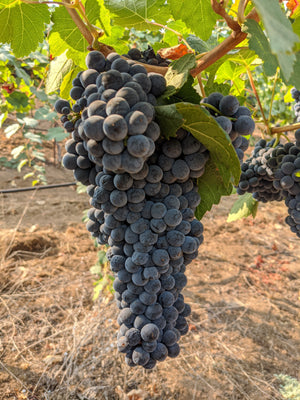
ESTATE PETITE SIRAH
Petite Sirah
We planted Petite Sirah as we absolutely loved the wine made by one of our neighboring vineyard winemakers (and mentor) Harvey Linebarier. It is best known for its extraordinary deep color, high levels of anthocyanins and full-bodied flavors of blueberry, chocolate, plums and black pepper. Our Petite Sirah is planted on the lower block of our upper hillside vineyard on trellis where it gets plenty of sun and cooler nights.
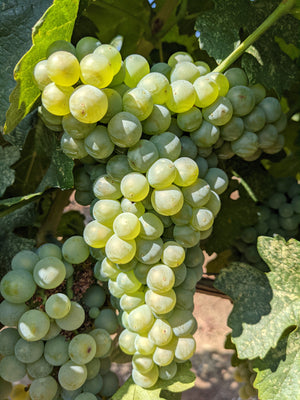
ESTATE VIOGNIER
Viognier
Viognier is far and away our favorite white wine and we decided to plant a small block on our upper vineyard with similar characteristics as found in the Rhône Valley – steep, shallow granitic soils, cooler nights – grown on vigorous 110R rootstock. We also use our Viognier in our Soleil Rhône-style blend.
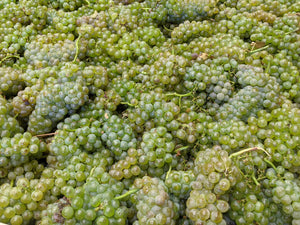
ESTATE ROUSSANNE
Roussanne
After working for several years with fruit from a neighboring vineyard, we were convinced we could graft Roussanne onto our lower vineyard where it grows at higher altitude in cooler conditions on trellis. While our Viognier wine is comparable to summer sunshine, we characterize our Roussanne wine as winter sunshine – warm, soft, happy. It is a terrific wine on its own and in our Soleil blend.

ESTATE SYRAH
Syrah
Always a crowd pleaser, we decided to graft new Syrah French clone 877 to our lower vineyard, where it thrives after experienting with several clones of Syrah from neighbor vineyards. We chose this clone because it is the richest of them all, with rich dark flavors, deep aromatics and a plush mouth that pairs extremely well with food.
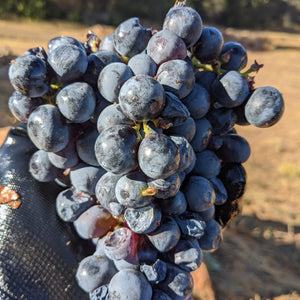
ESTATE MOURVEDRE
Mourvedre
Our Mourvedre clone 520 (a high-quality clone originally from France) was grafted onto some of our older original vines on the lower vineyard down by the tasting room. We chose this clone for making wines that pair exceptionally well with food. It makes a highly aromatic, yet softer red wine with its characteristic flavor note of black pepper.
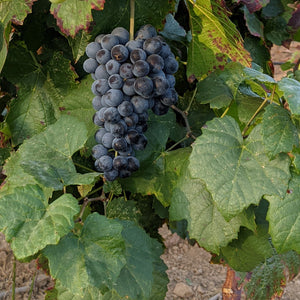
ESTATE GAMAY NOIR
Gamay Noir
We grafted Gamay cuttings from a premiere vineyard in El Dorado county onto 20-year old rootstock on a cooler lower east facing hillside of our estate. There are less than 25 acres of Gamay growing in El Dorado county, with a long waitlist to obtain grapes, and La Mesa is the only grower of Gamay in Amador county. The soil conditions here are very similar to those found in the Northern part of Beaujolais and Northern Rhône.
News
Low U.S. Case Shipping Rates Now Available
Read more

Jan 16, 2026
2026 San Francisco Chronicle Wine Competition Results
Read more
La Mesa Ties for Most Double Golds at 2025 Foothill Wine Competition
Read more
Active Military, Retired Veterans and First Responders
Read more


